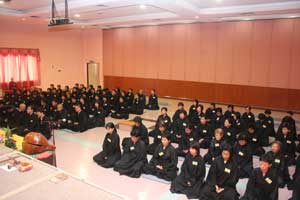Submitted by zhenliang on

The word “nien-fo” (invocation of Buddha or Buddha-name recitation) is originally a Chinese translation of the Sanskrit compound Buddhanusmrti meaning “the recollection or the bearing in mind of the attributes of the Buddha (nusmrti).” When the term was introduced to China , it became as a highly developed meditative system, with ties to a diversity of Buddhist scriptures and deities. Amitabha and the Pure Land represented but one among many such systems.
The major Indian sources and early Chinese treatises on Buddhanusmrti treat it as a complex practice involving several different approaches to contemplation. At its most basic level, Buddha-mindfulness begins with visual recollection of the thirty two major marks and eighty minor excellencies of the Buddha's glorified “body of form” (rupakaya). Progressing to successively deeper levels of practice, one may dispense with the Buddha's physical form and instead contemplate on his spiritual boundless power and omniscience; until one ultimately arrives at the Buddha's formless essence of enlightenment itself - a practice known as mindful recollection of the Buddha's “body of truth” (Dharmakaya). Thus although Buddhanusmrti may take a particular Buddha or Boddhisattva (such as Amitabha) as its starting point, it ultimately grounds itself in universal Mahayana truth of emptiness.
An early form of Buddhanusmrti can be found in the Nikaya of the Pali Canon. In the Nikaya, the Buddha advised his disciples to think of him and his virtues as if they saw his body before their eyes, whereby they would be able to accumulate merit and attain Nirvana or be saved from transmigrating in the evil paths.
In time Buddhanusmrti in Chinese Buddhist context began to place more emphasis on Buddha-name recitation than meditation on Buddha; in another words the invocation of the Amitabha Buddha-name to be reborn in the Pure Land . The Buddha-name recitation practice comprises various aspects: hearing and calling the name and meditating on Amitabha. Each of these actions lead to rebirth in the Pure Land if one condition is fulfilled: single minded attentiveness. Concentration or one-pointedness in the state of samadhi is not something an ordinary lay person in his secular life can easily achieve. Buddha-name recitation provides an easier path to tame the mind and achieve samadhi. Thus to recite Buddha-name is to return to our self-nature, true mind. If Buddha-name recitation becomes one pointed, our mind is the mind of the Buddha.
To help devotees to have a better grasp of the Pure Land practice, Than Hsiang Temple organized its first three-day Amitabha Buddha-name recitation retreat (Fo San) from 18/8/07 to 21/8/07 . One hundred and forty eight devotees took part with the female devotees again predominantly outnumbering the male devotees. Participants began checking in at the registration counters as early as 12.00 noon for the preliminary briefing and orientation by Venerable Zhen Xin, scheduled to begin at 3.00pm in the 5th floor Multi Purpose Hall. Rules and regulation on conduct to be strictly observed during the participant's stay were explained by Venerable Zhen Xin. She elaborated on the importance of mindfulness and behaving with proper decorum to rid oneself of the three mental poisons of craving, anger and delusion. At 8.30pm , Venerable Wei Wu performed the cleansing ceremony and followed this with a Dharma lecture.
The daily activities for the Fo San included morning chanting, general cleaning, eight- precept observance, Amitabha Buddha-name chanting, circumambulation, noble silence observance and dharma lectures. The retreat came to an end at 1.00pm on 21st August 2007 . All participants benefited from the retreat in varying degrees as the Fo San provided an opportunity for spiritual refuge and transformation through initiating the development of mindfulness and compassion, a prerequisite for liberation.
After a sojourn of three days at Than Hsiang Temple, the participants headed home with hearts filled with dharmic bliss.

